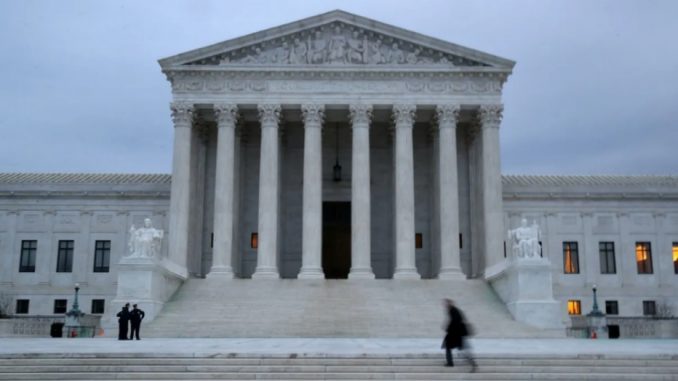
A draft rule of the federal judicial branch’s ethics body could potentially curb judges’ ability to be members of one of the country’s top conservative legal organization.
According to a story published Friday at RealClear Politics:
The ethical advisory arm of the federal judiciary is circulating a draft rule that would ban judges and their clerks from belonging to the Federalist Society, an organization aimed at fostering an originalist interpretation of the Constitution at law schools and through forums and debates across the country.
The proposed rules change is the latest salvo in a campaign to cast the Federalist Society as too political, and thereby politically risky, for judiciary participation. The Wall Street Journal editorial board labeled the proposal “judicial political mischief masked in high sounding rhetoric,” a step that is spurring a backlash among “judges and others” who should denounce it as “undermining legal education in America and perhaps violating the First Amendment right of association.”
The draft — which was put together by the Committee on Codes of Conduct of the U.S. Judicial Conference — warns that judges’ “formal affiliation” with the organization “is inconsistent” with portions of the codes of conduct for federal judges. It explains that such affiliation “could convey to a reasonable person that the affiliated judge endorses the views and particular ideological perspectives advocated by the organization; call into question the affiliated judge’s impartiality on subjects as to which the organization has taken a position; and generally frustrate the public’s trust in the integrity and independence of the judiciary.” It also says that relevant portions of the codes of conduct would “lead to similar conclusions on issues regarding outside activities, particularly for law clerks and staff attorneys.”
But, as the Ethics and Public Policy Center’s Ed Whelan pointed out at National Review, the draft does not give the same warning against being a member of the American Bar Association, while admitting that the group “has, at times, advocated for particular constituencies, causes, or agendas.” The disparity is noteworthy given the criticisms that the ABA has faced in the past for the liberal bias in many of those views and its alleged bias against conservative-leaning legal professionals in the nomination process.
Committee Chair and 8th Circuit Court of Appeals Judge Ralph Erickson told RealClear, however, that the draft was a “proposal open to discussion” for a 120-day period that ends in late May.
The Federalist Society describes itself as “a group of conservatives and libertarians interested in the current state of the legal order” and is “founded on the principles that the state exists to preserve freedom, that the separation of governmental powers is central to our Constitution, and that it is emphatically the province and duty of the judiciary to say what the law is, not what it should be.”
However, left-leaning detractors have portrayed the legal group in a far less charitable light, especially in light of the high-profile role the group’s members have played in President Donald Trump’s efforts to fill the federal bench with judges faithful to the Constitution.
In a speech given last March, Senate Judiciary Committee member Sheldon Whitehouse (D-R.I.) lambasted the organization’s role in the judicial confirmation process in the Trump era, describing a “vehicle for powerful interests, which seek not to simply “reorder” the judiciary, but to acquire control of the judiciary to benefit their interests.”
At then-Supreme Court nominee Brett Kavanaugh’s confirmation hearing, Senate Judiciary Committee member Mazie Hirono (D-Hawaii) said that the organization “focuses on changing the American legal system to align with an ultraconservative interpretation of the Constitution, including the overturning of Roe v. Wade.”
And while the draft opinion would give similar warnings about judges’ membership in the left-leaning American Constitution Society, Judicial Crisis Network’s Carrie Severino said that the comparison between the two is “inapt.”
She wrote, “Placing the Federalist Society in the same category as the ACS might appear judicious, and given the left’s dominance of legal academia and bar associations, a blow to the ACS would be a small price for liberals to pay for a blow to the Federalist Society.”
“Despite its ‘debate society’ vibe, the Federalist Society’s conservative predilections make the liberal legal establishment nervous, and this proposed new prohibition is the establishment’s attempt to hobble the group,” Quinn Hillyer wrote of the draft rule at the Washington Examiner. “The federal judges who review this proposal should reject it forthwith.”
*story by The Blaze